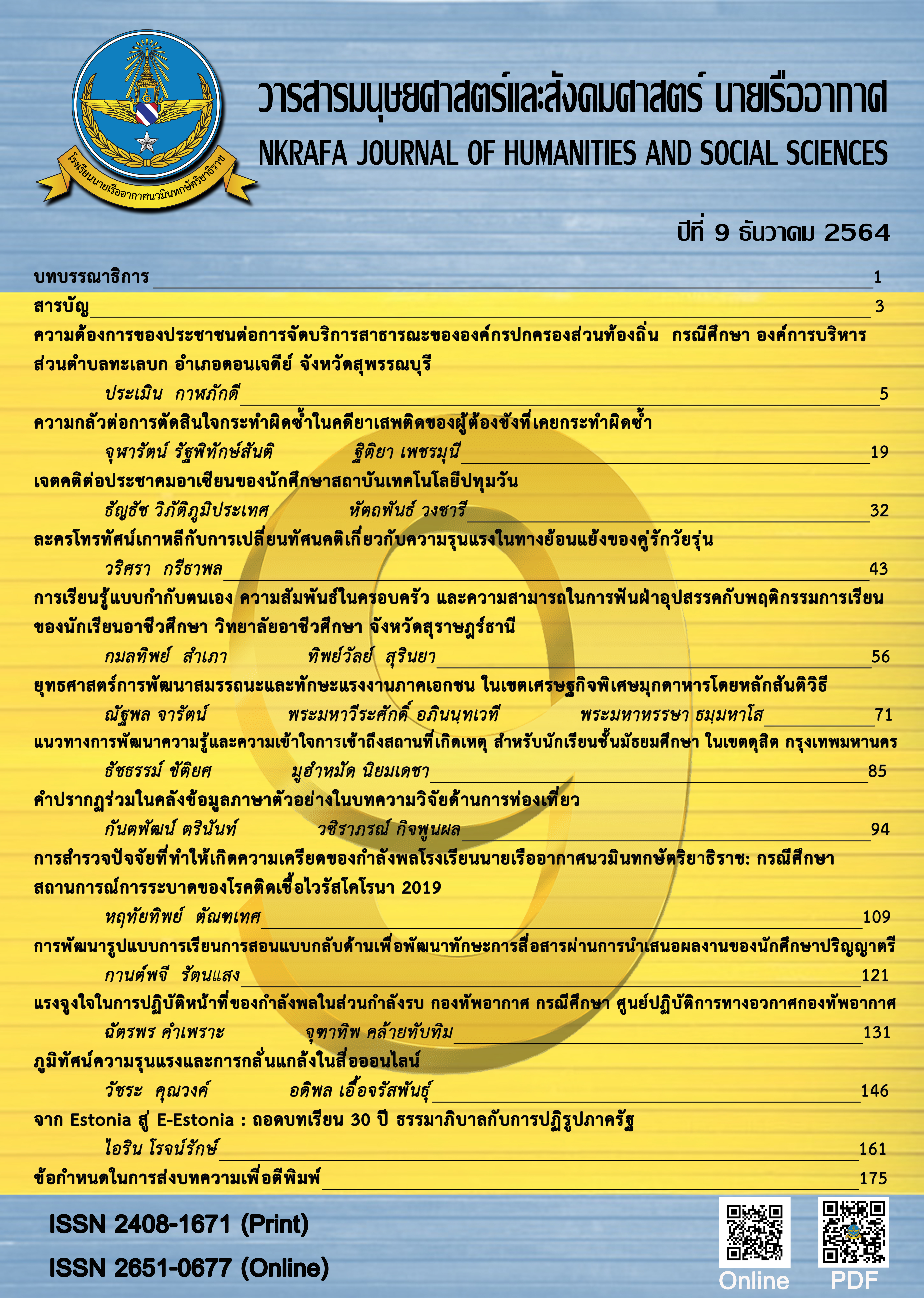Attitudes toward the ASEAN Community of Pathumwan Institute of Technology Students
Main Article Content
Abstract
The objectives of this research were 1) to study the attitudes toward the ASEAN Community of Pathumwan Institute of Technology students and 2) to compare their attitudes by classifying their sex, faculties, and years of study. A form of attitude measurement was used to collect data from 269 students of Faculty of Engineering and Faculty of Science and Technology, Pathumwan Institute of Technology, Semester 1/2020.Descriptive statistics, including mean and standard deviation and the inferential statistics, which were independent t-test and One-Way ANOVA, were applied to analyze the collected data. Research results showed that 1) their overall attitudes toward the ASEAN Community were at somewhat high levels (Mean = 3.61, S.D.= 0.72). When considering by aspect, the highest level of attitude was the willingness to support in the event of a disaster in the ASEAN member states (Mean = 4.08, S.D.= 0.89) whereas the lowest attitude was the perception of benefits of the family from joining the ASEAN Community (Mean= 3.15, S.D.= 1.17). 2) There were no statistically significant differences in the levels of overall attitudes toward the ASEAN Community when comparing by their sex and faculties. Meanwhile, the students from different years of study had a statistically significant difference in the levels of overall attitudes.
Article Details
บทความที่ได้รับการตีพิมพ์เป็นลิขสิทธิ์ของวารสารมนุษยศาสตร์และสังคมศาสตร์ นายเรืออากาศ
ข้อความที่ปรากฎในบทความแต่ละเรื่องในวารสารวิชาการเล่มนี้ เป็นความคิดเห็นส่วนตัวของผู้เขียนแต่ละท่าน ไม่เกี่ยวข้องกับโรงเรียนนายเรืออากาศฯ และคณาจารย์ท่านอื่น ๆในโรงเรียนนายเรืออากาศฯ แต่อย่างใด ความรับผิดชอบขององค์ประกอบทั้งหมดของบทความแต่ละเรื่องเป็นของผู้เขียนแต่ละท่าน หากมีความผิดพลาดใด ๆ ผู้เขียนแต่ละท่านจะรับผิดชอบบทความของตนเองแต่เพียงผู้เดียว
References
กรมอาเซียน กระทรวงการต่างประเทศ, ASEAN Mini Book, กรุงเทพมหานคร: Page Maker, 2556.
ASEAN Secretariat, “About ASEAN” [Online]. Available: https://asean.org/asean /about-asean. [Accessed : 2 March 2020].
สุรินทร์ พิศสุวรรณ, อาเซียน รู้ไว้ได้เปรียบแน่, กรุงเทพมหานคร: อมรินทร์พริ้นติ้งแอนด์พับลิชชิ่ง, 2555.
สุรินทร์ พิศสุวรรณ (2556), “ก้าวย่างที่มั่นคงของประเทศไทยกับการเข้าสู่ประชาคมอาเซียนในทศวรรษหน้า” [Online]. Available : https://www.psu.ac.th/th/node/5166. [Accessed : 2 มีนาคม 2563].
ดวงกมล ทองอยู่, เอกสารการสอนชุดวิชาจิตวิทยาเพื่อการดำรงชีวิต หน่วยที่ 1-7 (หน่วยที่ 7 จิตวิทยาสังคม), นนทบุรี: โรงพิมพ์มหาวิทยาลัยสุโขทัยธรรมาธิราช, 2559.
Plotnik, R. & Kouyoumdjian, H., Introduction to Psychology, (10th Edition), Belmont, CA: Wadsworth, Cengage Learning, 2014.
วีรวรรณ วงศ์ปิ่นเพ็ชร์ และกุลกนก มณีวงศ์, “ความสัมพันธ์เชิงโครงสร้างเชิงสาเหตุของความพร้อมในการเข้าสู่ การเป็นพลเมืองอาเซียนของเยาวชน อำเภอเมือง จังหวัดเชียงใหม่”, วารสารพฤติกรรมศาสตร์เพื่อการพัฒนา, ปีที่ 5, เล่มที่ 1, หน้า 139-148, 2556.
ธัญธัช วิภัติภูมิประเทศ, “เจตคติต่อประชาคมอาเซียนของนักศึกษามหาวิทยาลัยธุรกิจบัณฑิตย์”, BU Academic Review, ปีที่ 13, เล่มที่ 2, หน้า 61-71, 2557.
ธัญธัช วิภัติภูมิประเทศ, “เจตคติต่อความร่วมมือด้านเศรษฐกิจระหว่างอาเซียน-จีนของนักศึกษาจีน มหาวิทยาลัย ธุรกิจบัณฑิตย์”, ในรายงานสืบเนื่องจากการประชุมวิชาการมนุษยศาสตร์และสังคมศาสตร์ระดับชาติและนานาชาติ (สมาคมรัฐศาสตร์แห่งมหาวิทยาลัยเกษตรศาสตร์ และสถาบันเครือข่าย ณ KU Home กรุงเทพมหานคร), ครั้งที่ 2, 2558 ก, หน้า 107-114.
ธนบดี จึงสง่างาม, วัชรพล สิงห์เรือง, วุฒิ เปลี่ยนน้อย และวิศิษฐ์ ฤทธิบุญไชย, “ความพร้อมและทัศนคติของ นักศึกษามหาวิทยาลัยราชภัฏนครปฐมที่มีต่อการเปิดประชาคมเศรษฐกิจอาเซียน”, วารสารวิทยาลัยโลจิสติกส์ และซัพพลายเชน, ปีที่ 2, เล่มที่ 1, หน้า 1-12, 2559.
อรวรรณ สีลวานิช, “ความพร้อมของนักศึกษาคณะสังคมสงเคราะห์ศาสตร์กับการเข้าสู่ตลาดแรงงานประชาคม อาเซียน”, วิทยานิพนธ์ปริญญาพัฒนาแรงงานและสวัสดิการมหาบัณฑิต คณะสังคมสงเคราะห์ศาสตร์, มหาวิทยาลัยธรรมศาสตร์, 2554.
อรอนงค์ นิยมธรรม และวรเกียรติ ทองไทย, “เจตคติที่มีต่อการเข้าสู่ประชาคมอาเซียนของนักศึกษามหาวิทยาลัย เทคโนโลยีราชมงคลล้านนา ตาก”, วารสารวิชาการมนุษยศาสตร์และสังคมศาสตร์, ปีที่ 23, เล่มที่ 41, หน้า 273-290, 2558.
Benny, G. & Abdullah. K., “Indonesian Perceptions and Attitudes toward the ASEAN Community”, Journal of Current Southeast Asian Affairs, Vol 30, No. 1, pp.39-67, 2011.
Moorthy, R. & Benny, G., “Attitude towards Community Building in Association of Southeast Asian Nations: A Public Opinion Survey”, American Journal of Applied Sciences, Vol 9, No. 4, pp.557-562, 2012.
Siraprapasiri, P. & Na Thalang, C, “Towards the ASEAN Community: Assessing the Knowledge, Attitudes, and Aspirations of Thai University Students”, Journal of Southeast Asian Affairs, Vol 35, No. 2, pp.113-147, 2016.
Thompson, C. E. & Thianthai, C., Attitudes and Awareness toward ASEAN: Findings of a Ten Nation Survey, Singapore: ASEAN Studies Centre, 2008.
ASEAN Secretariat, ASEAN Economic Community Blueprint, Jakarta: ASEAN Secretariat, 2008.
ASEAN Secretariat, ASEAN Political-Security Community Blueprint, Jakarta: ASEAN Secretariat, 2009a.
ASEAN Secretariat, ASEAN Socio-Cultural Community Blueprint, Jakarta: ASEAN Secretariat, 2009b.
นงลักษณ์ วิรัชชัย (2555), “การกำหนดขนาดตัวอย่างในการทดสอบสมมติฐานวิจัย (เอกสารประกอบการบรรยาย เรื่อง วิธีการที่ถูกต้องและทันสมัยในการกำหนดขนาดกลุ่มตัวอย่าง)” [Online]. Available: https://lllskill.com/web/files/GPower.pdf. [Accessed : 2 มีนาคม 2563].
ธัญธัช วิภัติภูมิประเทศ, “จริยธรรมการวิจัยทางสังคมศาสตร์”. วารสารมนุษยศาสตร์และสังคมศาสตร์ มหาวิทยาลัยมหาสารคาม, ปีที่ 34, เล่มที่ 6, หน้า 52-59, 2558ข.
ผ่องพรรณ ตรัยมงคลกูล และสุภาพ ฉัตราภรณ์, การออกแบบการวิจัย, กรุงเทพมหานคร: สำนักพิมพ์ มหาวิทยาลัยเกษตรศาสตร์, 2555.
บุญชม ศรีสะอาด, การวิจัยเบื้องต้น, กรุงเทพมหานคร: สุวีริยาสาส์น, 2556.
สุนทรี โคมิน, เอกสารการสอนชุดวิชาจิตวิทยาทั่วไป หน่วยที่ 8-15 (หน่วยที่ 8 เจตคติกับพฤติกรรมมนุษย์), นนทบุรี: โรงพิมพ์มหาวิทยาลัยสุโขทัยธรรมาธิราช, 2551.
แพรภัทร ยอดแก้ว (2556), “ความสัมพันธ์ระหว่างภาวะผู้นำการเปลี่ยนแปลง ความรู้และทัศนคติต่อประชาคม
อาเซียนของ นักศึกษามหาวิทยาลัยราชภัฏนครปฐม” [Online]. Available : https://www.ms.src. ku.ac.th/smarts/smarts3/pdf/9.pdf. [Accessed : 2 มีนาคม 2563].
Bodenhausen, G. V. & Gawsinski, B., “Attitude Change”, In The Oxford Handbook of Cognitive Psychology, Reisberg, D. (Ed.), New York: Oxford University Press, 2013. pp. 957-969.


